-
Justine Triet: THE AGE OF PANIC (2013))
JUSTINE TRIET: THE AGE OF PANIC (2013
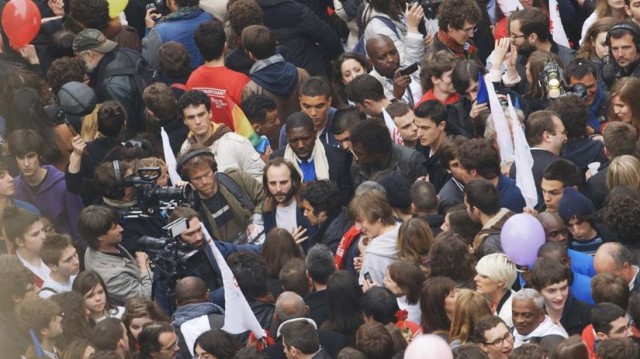
STILL FROM THE AGE OF PANIC (VINCENT MACAIGNE, CENTER)
Upheavals on a Paris day, personal and political
Justine Triet's first feature is a turbulent, boldly integrated and in part highly improvised mashup of two events that take place on the same long day: the squabbles of a divorced couple over the husband's visitation rights to their young daughters, and the climax of the Sarkozy-Hollande French presidential elections. For a little low budget film, this one is surprisingly ambitious and effective. The French title, La Bataille de Solférino ("The Battle of Solferino"), refers to the site of major Paris demonstrations of supporters of the two main candidates on election day May 6, 2012 outside Socialist Party headquarters on the street by that name, but also by association to the smaller but in its way also epic battle between Vincent (French generational cinematic touchstone du jour Vincent Macaigne) and his former wife Laetitia (Laetitia Dosch). She is a TV news reporter who is called out to cover the Rue Solférino excitement, reporting and interviewing participants from both sides. Vincent is a comic and graphic novel artist. Her leaving the two girls with young male babysitter Marc (Marc-Antoine Vaugeois), an aspiring pastry cook, makes it impossible for Vincent legally to visit them. A judge's letter instructs that he must be allowed to see them on the weekend, but only with their mother present. Laetitia blames this contretemps on Vincent, whom she regards as a deadbeat. In a striking proof that the personal is political and vice versa, the babes get dragged to the demo by Marc and Vincent comes following, so everybody has a shouting match. With a keen sense of rhythm and structure, Triet takes the action back to an eventually peaceful finale at Laetitia's apartment, providing a sense of resolution and hope.
Things begin at a fever pitch with Laetitia running around her big disorderly apartment, late for her unexpected call-out to cover the demos, while the two little girls scream and the young babysitter clearly has little on the ball. Vincent is calling, repeatedly, Laetitia's boyfriend Arthur has been there, and Vincent shows up. Laetitia has told Marc he's by no means to let her ex in, or anybody. Marc, overwhelmed, does let Vincent in. Then a neighbor Laetitia has instructed to combat just this eventuality, comes up and forces Vincent out of the flat. Later, the scene shifts to Laetitia in the thick of the crowd doing her reporting. Sound bites follow. Triet takes no political stand. The important thing is the parallel between the politically divided country and the split couple at odds with each other. Citizens love France, the couple loves their kids. But it's all a hyperactive, turbulent mess.
It's hard to imagine how the filmmakers managed not only to shoot the huge gathering of Hollande and Sarkozy supporters in Rue Solférino, sometimes seen from above, and mix it with the specific action of their film, especially when Marc, at Laetitia's instructions, brings the little girls there, and Vincent follows -- all this action taking place amid the teeming thousands of demonstrator-spectators. It's a wonder they didn't lose the kids. But the blend of real and staged events is a tour-de-force that Virgile Dumez of aVoir-aLire.com called "un Véritable "Red Bull" cinématographique," ("a veritable cinematic Red Bull"). That such epic events are so richly covered by Triet in a mere hour and a half is an accomplishment that shows much promise.
Heavy use of improv marks the various encounters in the film, between Laetitia and Vincent, Vincent and Marc, Vincent and his friend, law student, and de factor legal advocate Arthur (Arthur Harari), and toward the end the particularly droll encounter between Laetitia's new squeeze Virgil (Virgil Vernier) and Vincent back at the apartment, in the wee hours now, when Virgil is extraordinarily nice to Vincent -- and they all hug, including Vincent and Laetitia. Macaigne, a dreamy-eyed, sweet-faced and soulful dude with long hair, beard, and balding pate, is the epitome of the lovable nice guy who's not going to get the French equivalent of a job on Wall Street. He is a young everyman whose nature expresses the sweet heart of modern France that might survive racial tension and political polarization.
The Age of Panic/La Bataille de Solférino, 94 mins. Debut Cannes 20 May 2013, French cinemas 18 Sept. Enthusiastic French reviews (Allociné 3.8), especially from the prestigious and often picky Cahiers du Cinéma. I tried to see this film in Paris in Oct. but kept missing it. Screened for this review as part of the 6-16 March 2014 Lincoln Center-UniFrance series, Rendez-Vous with French Cinema.
Last edited by Chris Knipp; 01-01-2015 at 07:20 PM.
-
Rebecca Zlotkowaki: GRAND CENTRAL (2013)
REBECCA ZLOTKOWSKI: GRAND CENTRAL (2013)
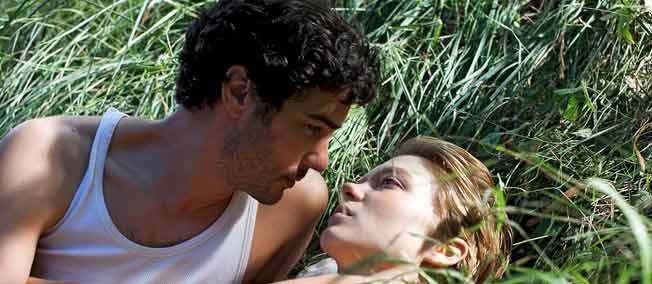
TAHAR RAHIM AND LÉA SEYDOUX IN GRAND CENTRAL
Dangerous love, dangerous work
In her second film Rebecca Zlotkowski works for tension by playing off two kinds of danger. Young Gary Manda (Tahar Rahim) comes to work as a low-level employee at a French nuclear plant. Then he connects with another worker, Karole (Léa Seydoux) and they have a hot affair, despite her being the fiancee of longtime employee Toni (Denis Ménochet). The team leader and promoter of esprit de corps is the loud, dominant Gilles (Olivier Gourmet). Using realistic location scenes and oppressive sound Zlotkowski gives the viewer an intense awareness of the danger of the work, far greater for the working class peons than higher-ups who get a different parking lot, better protection, and of course higher pay. What has this got to do with Gary and Karole? Nothing, really. And a slightly confusing finale points up that things aren't profoundly worked out. Nonetheless the hot love affair is played by hot young French actors of the moment. Gourmet can always be counted on to provide intensity and authenticity. And the less defined other players look right. Zlotkowski has made a good movie. But considering that Rahim debuted in Audiard's A Prophet and also played last year in Farhadi's The Past while Seydoux won a double prize at Cannes for her performance in Blue Is the Warmest Color, Grand Central feels like a relatively minor effort -- despite it too debuting in A Certain Regard at Cannes; a nomination for Gourmet at this year's Césars; and high French critical approval indicated by an Allociné press rating for Grand Central of 3.9 out of 5. But Grand Central has the feel of a good, solid old school American film, and Zlotkowski has cited an admiration for Frankenheimer, Nicholas Ray, and Raoul Walsh.
Grand Central will be remembered for its relentless and troubling concentration of the daily grind of low level nuclear workers whose routine means constant low levels of exposure to dangerous radiation and day-to-day danger of a misstep or accident that may do more serious damage. The radiation level cards the workers are wearing on the job are always ticking. It's not ever a matter of no exposure but of how much. The film starts off Gary and Karole in a flashy scene where in front of Gilles and Toni and all their coworker comrades drinking, she goes up to a standing Gary, just arrived, and gives him a long kiss whose effect of making him scared and nervous and excited and dizzy she declares is just what getting a "dose" (of radiation) feels like. Even long before Gary even goes into the training, in the opening scene of the film action begins at a high pitch with a future coworker picking his pocket on a train and him running angrily after the guy to grab it back.
Effort is made to counteract Tahar Rahim's slight, mild appearance by demonstrating repeatedly that he is fearless and physically strong. Audiard used him the same way but far more richly in A Prophet, introducing his character as a young prisoner who's a virtual virgin in tough jailbird ways -- but he's in for killing a cop, and soon is forced by mafiosos to kills another Arab prisoner, proving his looks are deceptive. An obvious contrast comes in the use of Olivier Gourmet, a big, heavy, blustering man who yet ultimately reveals a sense of hopelessness and defeat. Léa by further contrast seems poorly used here. The same tough edge that fit her role as the older lesbian lover in Blue Is the Warmest Color (and she still seems to have the short-cropped haircut of Kechich's film) makes her neutral and flat in this factory environment where she fits in a bit too well. It's never clear whether Gary and Karole represent a star-crossed love affair or just compulsive young sex.
The two turning points come obviously enough. Karole gets pregnant, and Toni can't father a child (due to radiation it's hinted) so it's obviously not his. Yet Karole pushes on for her and Toni to marry posthaste. Perhaps due to a reckless feeling prompted in him by these events -- the action is too breathless to know -- Gary gets overexposed to radiation and is furloughed from the plant.
The relentless electronic soundtrack suggests the director doesn't fully trust her film or her audience, but it works just the same. If you're responding, you watch in a state of constant tension that the electronics control and buy into the French blub that says "Every day becomes a menace."
Grand Central, 94 mins., scripted by Gaëlle Macé and Rebecca Zlotowski, debuted in Un Certain Regard at Cannes and opened in French cinemas 28 Aug. 2013. Screened for this review as part of the 6-15 Mar. 2014 Rendez-Vous with French Cinema, a joint series run by the Film Society of Lincoln Center, New York, and UniFrance.
Friday, March 7, 9:00pm – WRT; Saturday, March 8, 4:45pm – IFC; Sunday, March 9, 4:30pm – BAM; Monday, March 10, 3:30pm - WRT
In Person: Rebecca Zlotowski
Last edited by Chris Knipp; 01-01-2015 at 07:46 PM.
-
Nicole Garcia: GOING AWAY/UN BEAU DIMANCHE (2013)
NICOLE GARCIA: GOING AWAY/UN BEAU DIMANCHE (2013)
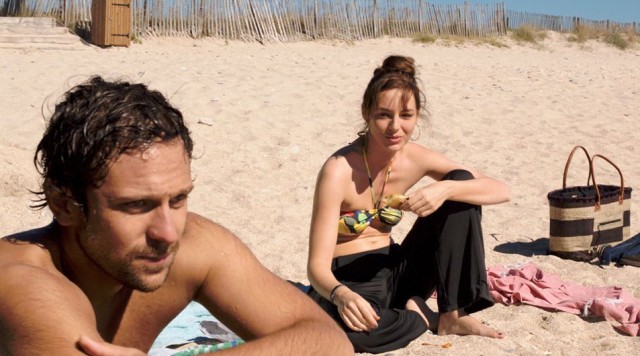
PIERRE ROCHEFORT AND LOUISE BOURGOIN IN GOING AWAY
Meandering mysteries
It will take you much of Nicole Garcia's meandering seventh film as a director to find out what the French title "Un beau dimanche" ("A beautiful Sunday") fully means. The pleasure of Garcia's narrative is that it's so devious, and takes us deep into the background of its main character. He's Baptiste Cambière (Pierre Rochefort, son of Nicole Garcia and the venerable star Jean Rochefort), a clearly brilliant, but mysterious and evidently troubled young man who works as a rambling grade school substitute teacher, who travels around France, unwilling to stay on at any one school more than a season. Baptiste clearly finds a cord of sympathy with Mathias (Mathias Brezot), a boy who's very bright in math but unmotivated. School ends, and Mathias' father forgets to come and pick him up. Baptiste gives him a ride to his father, who has forgotten it's his weekend to have the boy. It's the Whitsun Monday long holiday and Baptiste has nowhere to go, so he offers to take Mathias. One thing leads to another, and the next day he's driven to the beach where Mathias' mother Sandra (Louise Bourgoin) works managing a cafe kitchen.
By now Mathias, whos been neglected by both parents, has bonded with Baptiste and doesn't want him to go. And next it's Baptiste's turn to bond with Sandra. Her meanderings have been as wild and dangerous in their way as Baptiste's, about which we learn when, to save her from some gangsterish creditors she owes €50,000 to, Baptiste for the first time in years goes, with her and her son, to visit his wealthy family.
Going Away gradually reveals Baptiste's through his family members and flashbacks and what Sandra learns. A lot comes from his sister Emmanuelle Cambière (Déborah François) and more from his mother, Liliane (Dominique Sanda). Sanda is an icon, like Michel Lonsdale, who conveys a sense of history -- cinema history -- in her very being. There is something all-knowing, wise, and also stultifying in Liliane's declarations. This aristocratic family considers the rules it lives by immutable. But it is not Baptiste's intention to live by them.
As Baptiste Cambière, Pierre Rochefort is a fascinating character, monklike, gifted, and strange, and yes, also aristocratic; as well as gifted with remarkable explosive strength. (He has the quality of a Superman, impaired, but with an impairment leading possibly to exceptional powers.) Baptiste has the attraction of the dangerous and damaged. For some, Garcia's film will seem nonchalant and inconsequential, but for those who will look and think, it has some of the same richness of larger implications and complex questions of money, inheritance, class, and family that come up in Arnaud des Pallières' resonant, strange, unique film Adieu.
Going Away/Un beau dimanche, 91 mins., debuted at Toronto Sept 2013 and opened in France 5 Feb. 2014. It was screened for this review as part of the UniFrance-Film Society of Lincoln Center 2-16 Mar. 2014 film series Rendez-Vous with French Cinema. Showings:
Friday, March 7, 6:00pm – IFC; Monday, March 10, 4:00pm – EBM; Saturday, March 15, 9:30pm - WRT
Last edited by Chris Knipp; 02-17-2015 at 05:25 PM.
-
François Ozon: YOUNG AND BEAUTIFUL (2013)
FRANÇOIS OZON: YOUNG AND BEAUTIFUL/JEUNE ET JOLIE (2013
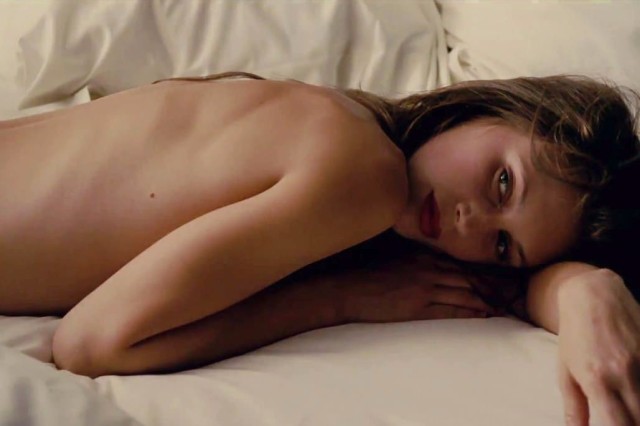
MARINE VACTH IN YOUNG AND BEAUTIFUL
Belle de jour ado
Ozon's Young and Beautiful (Jeune et jolie) is a shocker, but it's also simple and elegant, its elegant simplicity making way for ambiguities. Through this channel it's thought-provoking; but the beauty of this story, though it has rarely been told, is that it also contains little that is truly unexpected. Mike D'Angelo put it differently, tweeting from Cannes: "Character study of teen hooker initially seems banal, but banality proves to be its secret weapon." Jeune et jolie is a banal object that's also a glittering bauble sparkling from every angle.
A middle-class girl who lives at home and attends a famous Paris school, Lyçée Henri IV, has her 17th birthday, and then quietly sets about to become a pute, a prostitute. We might call her a "high priced call girl." With online media, it's a cinch for a well-informed ado (teenager) to set herself up for such "work," without the need of gangsters or pimps. In fact it's easier for a well-bred, well-off girl like Isabelle (long-limbed, gazelle-like ex-model Marine Vacth) to do it. Isabelle schedules up her meetings online or on a new cell phone she's bought for this purpose. She goes to expensive hotels and meets older, in several cases much older, men for sex.
And then something happens involving favorite client Georges (Johan Leysen) and her family finds out and, after several seasons have passed, she stops. Events lead to her talking to the a woman police officer and to a a male psychiatrist arranged by her mother (Géraldine Pailhas ). Naturally, the shrink (Serge Hefez) looks like one of her johns. So does her stepfather (Frédéric Pierrot ). Ozon doesn't take us inside the cold, elegant Isabelle's head. She is "precocious." But is she "warped," "perverse," "dirty" (her mother uses words like this) or just an adolescent discovering her sexuality and going through (in a word her stepfather uses) "a phase"?
A 17-year-old girl as striking and self-possessed as Isabelle can appear to be 20, or 18 anyway. Or, an older man who pays her €300 to come to his hotel room can pretend he thinks she is 20, because he wants to. The younger she is the fresher and more perfect she looks.
When the game is over Isabelle kisses a classmate at a party and he begins dating her, and spends the night at her house. It's on the way to being a normal sophisticated 21st century relationship of two young people. But Isabelle soon ends it. And because of what has happened it's not at all clear if she will have a "normal" sex life in years to come. Will Isabelle not become bored with an ordinary marriage and seek entertainment and profit in the afternoon, like Catherine Deneuve in Luis Buñuel's Belle de Jour? The precocious Isabelle (who takes the name Lea for her "work") is like an ado Belle de Jour. She's the ultimate jaded teenager, jaded far beyond her time -- before she has in truth learned much about life, she thinks she knows it all. And of course when she has sex with her classmate, Ozon can't resist showing that she can use sophisticated techniques to enhance his pleasure and enable his performance. Young and Beautiful is cool glittering prono, and a teenage manual for precocious sex.
Like Chabrol before him (and like Buñuel), François Ozon is a storyteller who tweaks the wilder edges of the bourgeoisie. It's normal to be precocious for young, sophisticated adolescents. Ozom touches on the tradition when he shows students at the Lyçée Henri IV discussing the poem by Arthur Rimbaud, a precocious poet at exactly that age, where he says no one is serous at 17. How naive are these young people? Christophe Honoré's La Belle personne (adapted from La Princesse de Clèves) adapts Paris teenagers into a complicated plot involving 17th-century courtiers.
As Leslie Felperin points out in Variety, Isabelle is first seen through binoculars wielded by her her younger brother, Victor (Fantin Ravat), "as she discreetly loosens her bikini bra to sunbathe topless. She’s indeed a character more often seen through others’ eyes, giving little of herself away." Victor, a slightly feminine little boy who wants to hear all about it, is like an understated eyepiece or alter ego for Ozon himself throughout. When Isabelle first 'sheds' her virginity with her "dumb" (con) "himbo" German boyfriend Felix, not even worth introducing to her family, Felperin notes, she is watching herself.
Young and Beautiful doesn't have the self-reflective meta- qualities of Ozon's other recent return to form, In the House, but is also, like it, a brilliant study of a risk-taking teenager, one this time whose gloss and sensuality may appeal even more to arthouse audiences. With a late, important cameo appearance by Charlotte Rampling.
Young and Beautiful/Jeune et jolie, 94 mins., debuted at Cannes 2013 and showed at many international festivals. Nominated for Two Césars (French Oscars) for Most Promising Newcomer (Marine Vacth) and Best Supporting Actress (Géraldine Pailhas). lIt opened in France 21 Aug. 2013 with highly favorable reviews (Allociné: 3.7). UK release was 29 Nov. Set to be released by Sundance in the US. It has been nominated for two 2014 César Awards: Géraldine Pailhas (Best Supporting Actress) and Marine Vacth (Most Promising Actress). Screened for this review as part of the UniFrance-Film Society of Lincoln Center series Rendez-Vous with French Cinema (6-16 Mar. 2014).
Friday, 7 Mar., 8:00pm – IFC; Saturday, 8 Mar., 6:30pm – WRT; Saturday, 8 Mar., 9:00pm - BAM
In Person: François Ozon.
Theatrical opening in NYC 25 April 2014.
Last edited by Chris Knipp; 01-02-2015 at 01:01 PM.
-
2 AUTUNS, 3 WINTERS (Sébastien Betbader 2013)
[This review is reprinted from the Nov. 2013 SFFS French Cinema Now Series reviews on Filmleaf.]
SÉBASTIEN BETBEDER: 2 AUTUMNS, 3 WINTERS (2013)
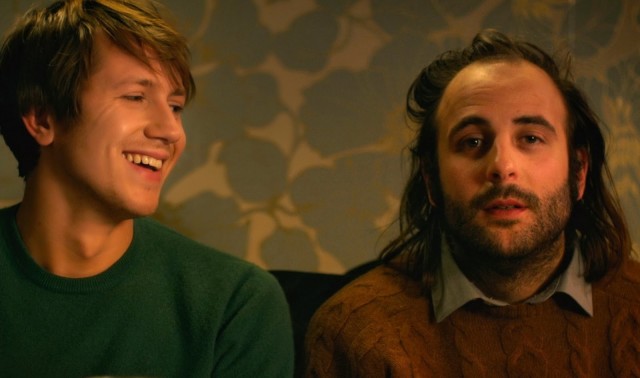
BASTIEN BOUILLON AND VINCENT MACAIGNE IN 2 AUTUMNS, 3 WINTERS
A 30-something coming-of-age-er with easy post-modern touches
Sébastien Betbeder shows with this second film that he's capable of mainstream, appealing stuff -- with an indie touch. His (TV film) debut Nights with Theodore (which won the SFIFF FIPRESCI Prize) was a romance that was strange bordering on creepy, but this time he gives us appealing white middle class French everyman-ish types from an arts background who settle down with girlfriends in their early thirties. The one-year-plus period contains the shift from early midlife confusion to finding a comfortable groove. The only thing that's eccentric is the excessive use of voiceover by the main characters, who also, so often that it becomes the film's ruling schtick, address the camera in solo reminiscences or turn to the audience and address us in the middle of a scene. Yes, it's too cute, but this movie is cute, and sweet.
The main character is Arman (Vincent Bacaigne, featured in the heralded new French young people's film The Battle of Solférino (which I tried hard to see in Paris but repeatedly missed). He is balding, long-haired, lightly bearded, with soulful puppy-dog eyes and a pretty face. Now 33, an amiable loser, Arman went to art school in Bordeaux and now lives in Paris, but won't tell us what he does for a living, doubtless because he knows he's not getting anywhere. Jogging in the local park, part of his attempt at a new start, he literally runs into his future life partner, Amélie (Maud Wyler). This meet-cute is so awkward and shy nothing yet comes of it. Arman keeps jogging every morning hoping in vain to meet Amélie again. Finally he runs into her at night when she's being mugged. He tries to intercede and gets stabbed. He's in the hospital for a while. She stays around.
This overlaps with a worse medical emergency that occurs to Arman's art school colleague and best mate Benjamin (Bastien Bouillon), who has a stroke: a skateboard boy calls 911. Benjamin is in the hospital longer than Arman, but recovers well and quickly. His novice speech therapist Katia (Audrey Bastien) becomes his girlfriend. Arman, Amélie, Benjamin, and Katia start double-dating, and go on a (for them) significant trip the Switzerland where Karia is from. They take a long hike up into the mountains.
All this is told with extensive to-the-camera narration by all four parties and divided into dozens of little chapters. Benjamin tells us what it feels like to lie under a bush face down unable to move and wait wondering if a skateboarder will have the sense to call for help. Amélie tells us what it was like to discover she's pregnant after crying midway during the challenging Swiss mountain hike and what she does about it, which almost ends her relationship with Arman when he belatedly finds out.
There is nothing very unusual in all this, except for the dual hospital trips, especially the stroke, but it's all delivered and filmed with a good deal of charm. Benjamin is an easygoing, reliably cheerful sort. It's he who smooths things over when Amélie has her crying jag in the mountains. Arman is more tentative and self-doubting, but together the two guys somehow balance each other out. Betbeder's simple, relaxed writing has an appealing way of presenting these 30-something issues so they're neither too heavy nor too flip.
Betbeder blends grainy 16mm and HD cinematography (by Sylvain Verdet) and lots of music by the French singer and songwriter Bertrand Betsch to the stylish mix that, in truth, seems more style than deep substance, but always pleases, its post-modern self-reflectiveness adding a touch of constant hipness without ever being hard to take. Arman and Benjamin, by the way, love Judd Apatow and find his Funny People "génial" (brilliant).
2 autonnes 3 hivers (the original title), 91 mins., debuted at Cannes in the ACID (Association du Cinéma Indépendant pour sa Diffusion) series, has been in several festivals including Hamburg and London. It opens theatrically in Paris 25 Dec. 2013 and I predict it will be a hit. What's not to like? Screened for this review as part of the French Cinema Now series of the SF Film Society, Nov. 7-10, 2013; presented Nov. 7 at 7 pm, with Betbeder featured for opening night of the series. This film went into limited US theatrical release Friday June 6, 2014
Last edited by Chris Knipp; 02-03-2017 at 06:32 PM.
-
MISS AND THE DOCTORS (Axelle Ropert 2013)
[This review like the preceding one is reprinted from the Nov. 2013 SFFS French Cinema Now Filmleaf reviews.]
AXELLE ROPERT: MISS AND THE DOCTORS (2013)
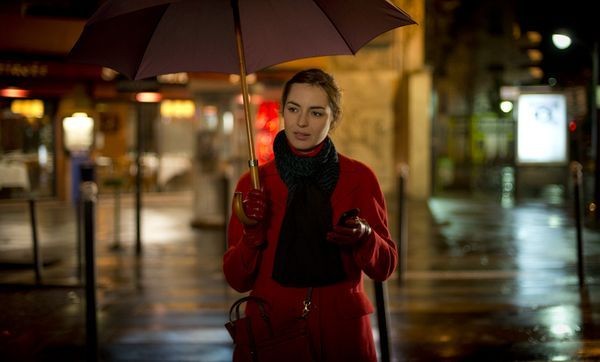
LOUISE BOURGOIN ROAMS THE 13e BY NIGHT IN MISS AND THE DOCTORS
Brotherly love triangle
In Miss and the Doctors the talented French writer and film critic Axelle Ropert continues the examination of tricky family relations and romantic ties she began with her 2009 Cannes Critic's Week debut The Woberg Family (R-V 2010). This time there is more focus, a distinctive urban setting, and a touch of noir. Two brothers, Boris and Dimitri Pizarnik (Cédric Kahn and Laurent Stocker), who are doctors with a joint practice, fall in love with the the same woman, a beautiful and implausibly elegant barmaid called Judith Durance (Louise Bourgoin), who's the mother of one of their patients, Alice (Paula Denis) -- a preternaturally composed and bespectacled preteen with diabetes that requires constant watching. Ninety-five percent of the action takes place in the working class, predominantly Asian 13th arrondissement of Paris, an important player here, which, especially since Judith works at night, makes for much gloriously garish and noirish color imagery by Céline Bozon, who also shot Woberg's good-looking rainy images and is the sister and cinematographer for actor-director Serge Bozon, who plays a friend of the brothers. (There is also a Paul Bozon, relation unknown, who plays a character called Rémi.) I have so far used the word "implausible" only once, but it will come up again. Much is to admire and enjoy about Ropert's work, but her writing background may lead her to invent more on the page than can make sense on the screen.
This is in part an illustration of the small and sometimes inbred world of French film, which leads to overlapping functions. Cédric Kahn has written and directed a number of films, only acted thrice, most recently in Elie Wajeman's cool, noirish, also Jewish-focused Aliyah where he plays the reverse role, the no-good addict brother. This time he's the dominant one, overshadowing his more hesitant blond brother Dimitri who's an alcoholic. We see Dimitri share rather oddly at several AA meetings. Boris' flaw is that he's overbearing and a bit gruff, which fits with Kahn's naturally deep, rough voice.
Besides Alice, Boris and Dimitri have other patients, of course, notably Kay (Alexandre Wu), a young epileptic who doesn't want to take his meds because they make him unable to get it up. "You don't understand, you don't have a girlfriend," the teen tells Boris. Of course Boris does, as it slowly develops, but this shows how odd and personal doctor-patient relations, not to mention doctor-patient-parent ones, tend to be in this movie. Things are dicey also with Annabelle (Camille Cayol), the brothers' medical secretary, who's in love with Boris. It doesn't seem like this double-doctor thing has a future and in fact it doesn't, and Annabelle has to be let go as a result of poor returns.
Things go back and forth between Judith and Boris with Dimitri's alcohol issues and desire to compete for Judith in the way. And Alice's father Max (Jean-Pierre Petit ), absent in Italy for a decade, reappears in response to a random phone call from Judith. The reappearance of Max is one of several ways the conflicts and their resolution both seem increasingly implausible -- there's that word again -- toward the end. There's a cute scene between Alice and Kay, the latter now working at a slurpy shop, with another, junior medical romance now hinted at, but it seems just a contrivance. So also is the way the sibling doctors just happen by pure chance to be called in to treat a medical problem of Max's, when he's just back but hasn't yet seen Judith.
What's noirish is Judith's barmaid lifestyle, and the slightly dicey, colorful, and largely nocturnal 13th arrondissement as seen in Céline Bozon's nice images. Another contrivance is Serge Bozon's scene as an intermediary friend (named Charles) sent back and forth one evening, Cyrano-like, between Boris and Judith to determine their feelings. Dimitri is reluctant to believe he's not in the running -- Ropert may have a bit of a thing for doomed romantic relationships. When Dimitri's hopes crumble the joint medical practice also disbands and Dimitri sets up a practice on the French Riviera; his glimpsed office seems to look right out onto a resort beach. Miss and the Doctors -- whose more sensible if hard to render French title means "Stick out your tongue, Miss" -- at this point seems to have dissolved into an American-inspired rom-com, and some of its basic pretenses have dissolved with it. But Ropert is original certainly and both her films use handsome visuals nicely to build the sense of particular location. These is a good use of actors -- even the static Bourgoin, from Anne Fontaine's mediocre Girl from Monaco becoming a striking icon of mysterious beauty. Music by Benjamin Esdraffo (of Bozon's La France) adds a verve that helps the locations come to life as part of the story. Jordan Mintzer of Hollywood Reporter, in an enthusiastic review that links this film with late Truffaut, comments that the music "reveals shades of New Wave composers Michel Legrand and Georges Delerue."
Torez la langue, mademoiselle, 102 mins., opened theatrically in France 4 Sept/ 2013 and was well received by local critics (Allociné press rating 3.6). Screened for this review as part of the San Francisco Film Society's French Cinema Now series (shown at Landmarks's Clay Theater 7-10 Nov.).
Last edited by Chris Knipp; 01-02-2015 at 01:04 PM.
-
THE SCHOOL OF BABEL (Julie Bertuccelli 2013)
JULIE BERTUCCELLI: THE SCHOOL OF BABEL/LA COUR DE BABEL (2013)
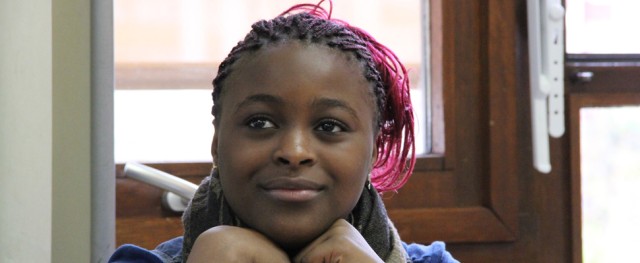
France welcoming young newcomers
Julie Bertuccelli's documentary is beautiful and colorful from the start, when some of the dozen or so 11-15-year-old "reception class" students at the school of La Grange aux Belles in Paris's 10 arrondissement go up and say and write "hello" in their native languages on the blackboard. They are black and white, Hispanic and Arab, and speak many languages. An argument breaks out right away about religion and language. Can a Christian use as-salaamu 'alaykum as a greeting, since it comes from Islam? It doesn't matter. They are instant friends. Though we see some acting out from several of the African girls, everyone is there to learn and to help each other as they all struggle to adapt to the French environment, academic program, and the French language. The prevailing spirit is of giving and sharing.
This is these infinitely various young people's "homeroom," the teacher, Brigitte Cervoni, who is patient, encouraging, but firm in constnatly correcting errors, is their faithful helper. Yes, this film is a bit like a non-fiction version of Laurent Cantet's Palme d'Or winning French classroom feature Entre les murs, but also will recall Nicolas Philibert's memorable study of elementary school To Be and to Have, with the similarity to the latter that the end-of-year farewells (this film too shot over the course of a year) are especially emotional because the teacher is retiring from the classroom, in this case to become a government inspector.
It's hard to imagine anything more touching than the group hugs at the end of the year, or the moment when a Ukrainian girl sings a beautiful song for classmates.
The kids tell about how they have come from bigger houses and have to face tiny accommodations in this expensive city. The very pretty Lebanese girl (who has also lived in Egypt) must leave because the government has found an apartment for her and her mother in Verdun. It seems a raw deal, but it means they will have a comfortable place to live, and they fear refusing the offer would offend authorities when their status is still uncertain.
Details emerge about many of the students. In particular Rama, from Senegal, has a way of acting out all the time, refusing to admit any fellow students are her friends. IIt turns out she was mistreated b her father's family back home, and the anger lingers in a hostile manner and neglect of her schoolwork. The lack of affect of Xin, a girl from China, is explained when it turns out her mother came to France ten years ago and she was by herself, and they're still cut off since her mother is working at a restaurnat all the time. But thanks to the new culture and the friendship of classmates Xin becomes a happier, more outgoing girl. Luca, from Northern Ireland, who his mother says was diagnosed when young with Asperger's and who hates math, also seems to grow into an otherwise good academic performer who is sometimes outspoken. A Serbian boy, typically for immigrants, turns out to be the bet in his family at French, acting as translator for his parents. And always Brigitte Cervoni is present in the background quietly prompting, encouraging, and correcting.
The theme of the French title, "The Courtyard of Babel," is rhythmically asserted with recurrent overhead shots of the school's courtyard, where students mingle freely.
All in all, this adds up to a glorious advertisement for the French social system. Except for a severe swimming instructor who sidelines a girl who has come to the pool repeatedly without the proper gear, we see only kindness, and it's hard not to make comparison with the US's current ruthless treatment of the undocumented, who are in jails, not schools.
French release 12 March 2014.
Saturday, March 8, 12:45pm – IFC; Sunday, March 16, 1:30pm - WRT Coming March 12 release in France.
Last edited by Chris Knipp; 01-02-2015 at 01:07 PM.
 Posting Permissions
Posting Permissions
- You may not post new threads
- You may not post replies
- You may not post attachments
- You may not edit your posts
-
Forum Rules





 Reply With Quote
Reply With Quote






Bookmarks